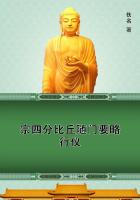The first proposition must be ******, in it predicate and subject must be alike; for were they unlike, their connection - since in accordance with their diversity the determinations are not directly one - would have to be first of all proved by means of a third. The first principle must thus be identical. Fichte now proceeds further to distinguish in this first principle the form and content; but in order that this same may be immediately true through itself, form and content must be again the same, and the principle conditioned by neither. It signifies A = A, the abstract undetermined identity; that is the proposition of contradiction, wherein A is an indifferent content. Fichte says, “Thought is by no means essence, but only a particular determination of Being; there are outside of it many other determinations of our Being. I merely remark this, that when 'I am' is overstepped, Spinozism is necessarily reached. Its unity is something which ought to be produced through us, but which cannot be so; it is not anything that is.” The first proposition is then that I am identical with myself, Ego = Ego;(12) that undoubtedly is the definition of the ego. The subject and the predicate are the content; and this content of the two sides is likewise their relation, i.e. form.
Relation requires two sides; the relating and the related are here, however, the same; for on account of the simplicity of the ego, there is nothing but a relation of the ego to the ego. I have knowledge of myself; but in so far as I am consciousness, I know of an object which is different from me, and which is then likewise mine. But the ego is in such a way identical with its difference that what is different is immediately the same, and what is identical is likewise different; we have a difference without a difference. Self-consciousness is not dead identity, or non-Being, but the object which is identical with me. This is immediately certain; all else must be as certain to me, inasmuch as it must be my relation to myself. The content must be transformed into the ego, so that in it I have my determination alone. This principle is at first abstract and deficient, because in it no difference, or a formal difference only is expressed; whereas the principle should possess a content: a subject and a predicate are indeed distinguished in it, but only for us who reflect upon it, i.e. in itself there is no difference, and consequently no true content. In the second place, this principle is indeed the immediate certainty of self-consciousness, but self-consciousness is likewise consciousness, and in it there is likewise the certainty that other things exist to which it stands in an attitude of opposition. In the third place, that principle has not the truth in it, for the very reason that the certainty of itself possessed by the ego has no objectivity; it has not the form of the differentiated content within it - or it stands in opposition to the consciousness of an “other.”
Now in order that determination should come to pass, i.e. a content and difference, it is essential for Fichte that a second principle should be established, which in regard to form is unconditioned, but the content of which is conditioned, because it does not belong to the ego. This second principle, set forth under the first, is, “I assert a non-ego in opposition to the ego,” and in this something other than absolute self-consciousness is set forth.(13) To this pertains the form therein present, relation; but the content is the non-ego, another content from the ego. We might say that through this content the proposition is independent, since the negative therein is an absolute, as truly as the reverse - that it is independent through the form of opposition which cannot be derived from the original. Here, then, we have no more to do with derivation, although this derivation of opposition from the first proposition was all the same demanded. Inasmuch as I posit another in opposition to the ego, I posit myself as not posited; this non-ego is the object generally, i.e. that which is opposed to me. This other is the negative of the ego; thus when Fichte called it the non-ego he was expressing himself in a very happy, suitable, and consistent manner. There has been a good deal of ridicule cast on the ego and non-ego; the expression is new, and therefore to us Germans it seems strange at first. But the French say Moi and Non-moi, without finding anything laughable in it. In this principle the positing belongs, however, to the ego; but because the non-ego is independent of the ego, we have two sides, and self-consciousness relates itself to another. This second proposition thus signifies that I posit myself as limited, as non-ego; but non-ego is something quite new to be added. On the one side we thus have before us a field which is merely appropriated from the ego; and in this way we have before us the non-ego as our object.
To these is added yet a third proposition, in which I now make this division into ego and non-ego:
it is the synthetic principle, the proposition of ground, which in content is unconditioned, just as in the second was the case in regard to form. This third proposition is the determination of the first two through one another, in such a way that the ego limits the non-ego. “In and through the ego both the ego and the non-ego are posited as capable of being mutually limited by means of one another, i.e. in such a way that the reality of the one abrogates the reality of the other.” In limitation both are negated, but “only in part” ; only thus are synthesis and deduction possible. Iposit the non-ego, which is for me, in myself, in my identity with myself; thus I take it from its non-identity, its not-being-I, that is to say I limit it. This limitation of the non-ego Fichte expresses thus: “I place in opposition to the ego,” and indeed “to the divisible ego, a divisible non-ego.”















